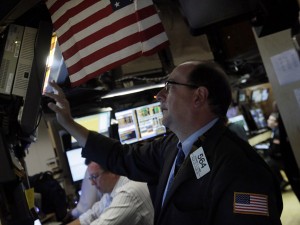World shares dive, gold drops on Fed policy
LONDON — Stock markets tumbled around the world on Thursday and gold slumped close to a three-year low after the US Federal Reserve signalled it would wind down its massive stimulus programme this year.
Indications the Fed is looking to end its bond-buying policy triggered a steep selloff overnight on Wall Street, with markets in Asia and then Europe following in turn.
London’s benchmark FTSE 100 index fell 2.28 percent to stand at 6,204.04 points in afternoon trade, Frankfurt’s DAX 30 dived 2.58 percent to 7,985.43 points and in Paris the CAC 40 slumped 2.49 percent to 3,743.57.
Earlier Tokyo shed 1.74 percent, Seoul tumbled 2.00 percent, Sydney sank 2.12 percent, Hong Kong slumped 2.9 percent and Shanghai fell 2.77 percent.
Wall Street opened down sharply Thursday after booking stiff losses the previous day.
The Dow Jones Industrial Average shed 1.06 percent to 14,952.65 points, while the broad-based S&P 500 fell 1.19 percent to 1,609.48 points, and the tech-rich Nasdaq Composite Index tumbled 1.25 percent to 3,400.10 points.
On forex markets, the European single currency fell to a 10-day low at $1.3199, down from $1.3297 in New York late on Wednesday.
On the London Bullion Market, the price of gold tumbled as low as $1,286.20 an ounce — the precious metal striking a point last seen in September 2010.
Eurozone bonds fell across the board, including safe-haven German government debt, pushing up interest rates. Yields on 10-year German bond, or Bunds, climbed to 1.67 percent, the highest level since February.
The Fed had said on Wednesday that it would keep in place its $85-billion-a-month bond-buying program, which is known as quantitative easing (QE), as unemployment remains high and growth in the world’s top economy was being held back by government spending cuts.
However, in a news conference, Fed chairman Ben Bernanke said that the US central bank’s policy committee “currently anticipates that it would be appropriate to moderate the monthly pace of purchases later this year” if the economic outlook continued to improve.
“Ben Bernanke has put the cat well and truly among the pigeons with his statement that asset purchases would begin slowing by the end of this year,” said analyst Yusuf Heusen at trading firm IG.
“It does feel as if the Fed chairman has pulled the rug from underneath the stock market rally, and he certainly seems to have dealt a killer blow to gold.”
A rising greenback makes dollar-priced gold more expensive for buyers using rival currencies, weighing on demand.
The Fed also upgraded its assessment of the economic recovery, saying unemployment may fall to 6.5 percent by the end of 2014 — one condition previously set to justify rolling back its stimulus program.
Global markets have been sent into turmoil in recent weeks as dealers priced in a possible end to QE.
The program had helped fuel a rally in equities since the Fed said in September it would provide vast sums of cash until the world’s biggest economy showed signs it was back up to strength.
Adding to selling pressure was preliminary data on Chinese manufacturing from HSBC, which showed activity contracted again in June and was at a nine-month low point.
The British banking giant HSBC said its preliminary purchasing managers’ index for China came in at 48.3, worse than May’s final reading of 49.2, and its lowest since September.
A reading below 50 indicates contraction, while anything above signals expansion.
